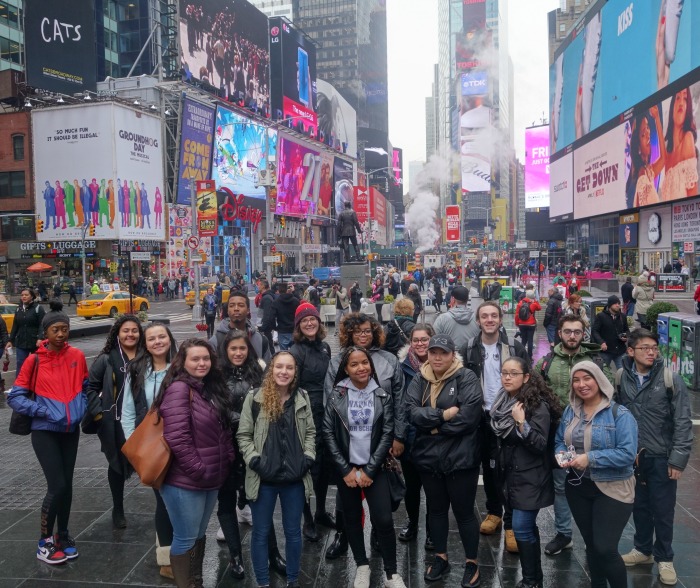Interdisciplinary Studies Minor
The Minor in Interdisciplinary Studies
The field of Interdisciplinary Studies recognizes that we live in a complex and interrelated world. This minor introduces students to the practices of interdisciplinarity: using critical methods and bodies of knowledge from multiple disciplines to understand real-world issues and problems. A sophisticated comprehension of serious topics – such as sexual violence, mass incarceration, poverty, racial and economic inequality, environmental degradation, technological change, epidemics, or global migration, for example – requires analysis of dimensions that include the cultural, historical, political, psychological, social, gender, and economic. Through a pedagogy centered on active learning, students in the Minor in Interdisciplinary Studies develop critical thinking and analytical skills that prepare them to tackle the difficult topics and advanced work required in law and graduate schools and high-level careers.
Learning Outcomes
Students will:
• Read, write, and communicate orally in response to a wide variety of disciplinary and interdisciplinary texts.
• Analyze and synthesize ideas and information from multiple disciplinary sources and perspectives.
• Identify, articulate, and reflect upon theoretical and methodological differences among disciplines across the arts, humanities, and sciences.
• Select and apply appropriate tools from two or more disciplines to significant questions, issues, or problems that would benefit from interdisciplinary analysis.
• Construct knowledge together and collaborate effectively and respectfully.
Credits Required
18
Minor Coordinator
Professor Richard Haw, Department of Interdisciplinary Studies (212.237.8076, rhaw@jjay.cuny.edu).
Advisor: Adriana Pérez, Department of Interdisciplinary Studies (212.237.8460, aperez@jjay.cuny.edu).
Experiential Learning Opportunities
The Interdisciplinary Studies courses are rooted in experiential learning where students engage in interactive classroom exercises, independent research projects, fieldtrips and service and learning opportunities that transcend the classroom. Students should anticipate being engaged, enlivened and compelled to be active participants in their learning experiences. In recent years, first year students have taken several field trips around NYC and visited the Eastern State Penitentiary in Philadelphia. Students have conducted community-based surveys of food deserts, voting patterns, and have created self-guided tours of major museums, landmarks, and historic neighborhoods. Students have opportunities to interact with guest speakers and performers and pursue internships integrating academics and action with the Vera Institute of Justice, state and city elected officials, and social justice organizations.
Requirements
The minor in Interdisciplinary Studies requires a total of 18 credits of which 3 credits are required and 15 credits are electives. A maximum of two courses can overlap with a student’s major, other minor or program.
| ISP 101 | Seeking the City: Interdisciplinary Perspectives on New York | 3 |
| Subtotal: 3 |
Part Two. Electives
Select five ISP courses. At least one course must be at the 300-level or above. Only one 100-level course may be applied to the minor electives.
Select zero or only one 100-level course
| ISP 100 | Justice: Who's In, Who's Out | 3 |
| ISP 110 | When Nature Roars: Global Catastrophe & Human Responsibility | 3 |
| ISP 112 | Going Places: Travel & Transformation | 3 |
| ISP 115 | Voices of Migration: Interdisciplinary Perspectives on Global Movement | 3 |
| ISP 122 | "Those" People: Stereotypes in U.S.A. | 3 |
| ISP 125 | You Are What You Eat: Food & Culture in the U.S. | 3 |
| ISP 130 | Creative Movements: How, When and Why They Happen | 3 |
| ISP 132 | Monsters and What They Mean | 3 |
| ISP 134 | Imagining Other Worlds | 3 |
| ISP 140 | Murder: Historical and Cultural Perspectives | 3 |
| ISP 145 | Why Gender Matters | 3 |
| ISP 147 | Life Stories | 3 |
| ISP 160 | The Twentieth Century: A Decade in Depth | 3 |
| ISP 171 | Ripped from the Headlines: Art from Current Events | 3 |
Select four or five courses. At least one must be at the 300-level or above.
| ISP 211 | Revolutions | 3 |
| ISP 215 | Colorism: A Global Perspective on Colonial Violence | 3 |
| ISP 224 | Constructions of Difference in the U.S.A. | 3 |
| ISP 226 | White Supremacy: Constructions of Race and Institutionalized Racism | 3 |
| ISP 235 | Apples & Oranges: Form & Meaning in the Arts | 3 |
| ISP 236 | Truth & Creativity: How We Make Meaning | 3 |
| ISP 237 | Laughing at Ourselves: Comedy and Identity | 3 |
| ISP 242 | Stuff: An Investigation into the Meaning of Things | 3 |
| ISP 246 | Forbidden Love: Cultural and Social Perspectives | 3 |
| ISP 248 | Getting Even: Forgiveness and Revenge | 3 |
| ISP 255 | Technology and Culture | 3 |
| ISP 264 | Remembering & Forgetting in Public & Private | 3 |
| ISP 265 | Evolution and Its Impact | 3 |
| ISP 273 | The Stories We Tell | 3 |
| ISP 277 | Experiential Learning in Social Justice: Field Preparation | 3 |
| ISP 321 | Moral, Legal and Ethical Dilemmas that Shape the U.S.A. | 3 |
| ISP 322 | Making Waves: Troublemakers, Gadflies and Whistleblowers | 3 |
| ISP 334 | Sex, Gender and Justice in Global Perspective | 3 |
| ISP 335 | Violence in the Pursuit of Justice | 3 |
| ISP 336 | Just Intentions: Global Humanitarianism | 3 |
| ISP 380 | Selected Topics in Interdisciplinary Studies | 3 |
| ISP 385 | Faculty Mentored Research Experience in Interdisciplinary Studies | 3 |
| Subtotal: 15 |
